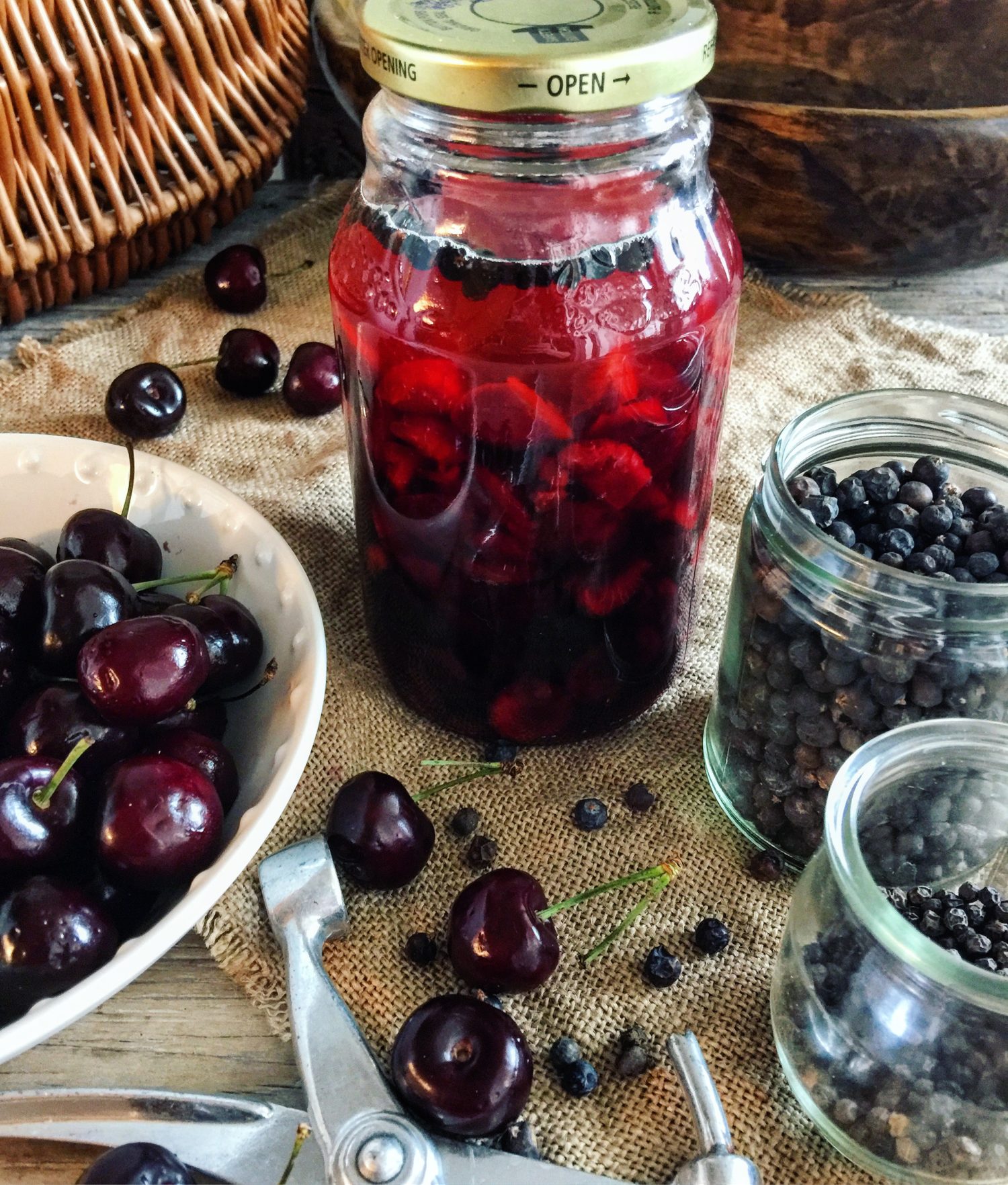
Cherry Shrub
A fruit syrup, preserved with vinegar and mixed with water or alcohol to make a tangy, refreshing beverage. An old-fashioned favorite, shrubs have steadily made a comeback in the last several years — especially on cocktail menus.
Ingredients
- 2 cups fruit, in this case cherries , cleaned, peeled, seeded, and chopped (if necessary)
- 2 cups vinegar
- 1 tbsp whole juniper berries lightly cracked by pressing on them with the bottom of a jar (but don't pulverize them)
- 1 tbsp whole allspice lightly cracked by pressing on them with the bottom of a jar (but don't pulverize them) Can be replaced with black peppercorns
- 1 1/2 to 2 cups sugar
Instructions
-
Sterilize the container: Wash the canning jar in hot, soapy water and rinse thoroughly. Submerge in a pot of warm water to cover by 1 to 2 inches, bring to a boil, and boil for 10 minutes. For the lid or cap, wash it in hot, soapy water; rinse well; and scald in boiling water.
-
Add the fruit: Carefully remove the jar from the water using canning jar lifters or tongs and place on the counter. Transfer the prepared fruit in the container. Add the juniper berries and allspice.
-
Add the vinegar: Place the vinegar in a saucepan and heat to just below the boiling point, or at least 190°F. Pour the vinegar over the fruit, leaving at least 1/4-inch headspace in the jar. Wipe the rim with a clean, damp cloth, and cap tightly.
-
Let it stand: Let the vinegar cool completely and then store the jar in a cool, dark place, such as a cupboard or the refrigerator. Let it stand at least 24 hours and up to 4 weeks until the desired flavor is reached.
-
Strain it: Strain the fruit from the vinegar through a damp cheesecloth or coffee filter. Do this at least once, or repeat as desired until the vinegar shows no cloudiness. Discard the fruit or save it for another purpose (it's often delicious for use in chutneys).
-
Add the sugar: Place the fruit-infused vinegar and sugar in a saucepan. Bring to a boil, stirring to dissolve sugar. Remove from heat and let cool. Pour into a clean, sterilized container (use the original mason jar or other bottles; see step 1 for sterilization procedure) and cap tightly.
-
Store: Store the shrub syrup in the refrigerator. Tightly sealed, it can last for up to 6 months. Taste before using to make sure the flavor is still good. Discard immediately if it has mold or any signs of fermentation, such as bubbling, cloudiness, or sliminess.
-
Serve: To serve, mix 1 tablespoon shrub syrup into a glass of still or sparkling water, or even champagne. Taste and add more syrup, if desired. Shrub syrups may also be used as cocktail mixers, in salad dressings, and more.
Recipe Notes
Equipment;
Quart-sized canning jar or other glass container with a lid or cap
Deep pot Measuring cups (liquid and dry)
Funnels (useful, but not required)
Saucepan
Food thermometer
Clean kitchen cloth or paper towel
Fine cheesecloth or coffee filter
Berries are perhaps the finest fruit for shrubs, but cherries, peaches, plums, pears, and other fruits may be used. They should be ripe and sweet, but they do not need to be perfect; this is a great opportunity to use farmers market "seconds" and any fruit that is abundantly in season. Fruit should be thoroughly washed and may be peeled, chopped, or lightly crushed to shorten the infusing process. Ginger, citrus peel, or even peppercorns may also be added for flavor.
Any vinegar may be used, as long as it is labeled as having at least 5 percent acidity. Distilled white vinegar has a clear, sharp flavor; apple cider vinegar tends to be milder with a fruity flavor; and wine vinegars, while more expensive, often provide a superior smooth flavor. Balsamic vinegar is delicious with cherries and strawberries.
Making Shrubs Safely
Because vinegar is high in acid, it does not support the growth of the bacteria that produces botulism. However, some vinegars may support the growth of other harmful bacteria, so cleanliness and proper storage is important.